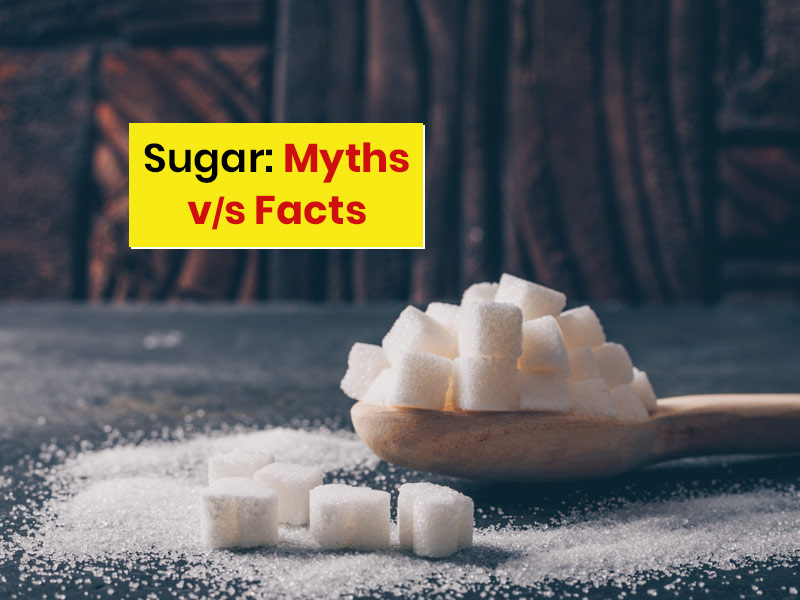
‘Sugar is a white poison’. Chances are that you might have heard this statement several times. Experts and fitness enthusiasts preach about quitting sugar all together. Some say it causes diabetes. Some even refrain from eating fruits. But is sugar the villain it is made out to be? Onlymyhealth spoke to Ms. Rajeswari V Shetty, HOD-Dietetics, Fortis SL Raheja Hospital, Mahim, to understand how sugar works in the body. In the process, she debunked three popular myths on this so-called ‘white poison’.
Table of Content:-
What Is Sugar?
First, let us understand what sugar is. Sugar is a carbohydrate and a source of energy in our diet. It is of several types: some occur naturally, such as in fruits and dairy products; while others are manufactured and added to a range of food items. Sugars are basically of two kinds:
- Simple Sugars: Also known as monosaccharides, these include glucose and fructose.
- Compound Sugars: White refined sugar is an example of compound sugar, also known as disaccharides. During digestion, these disaccharides are broken into monosaccharides.
Sugar is available in different forms, such as white, raw, and brown sugar, honey, and corn syrup.
Also read: Trying To Quit Sugar Yet Craving It? Healthy Alternatives You Can Try
Myths V/S Facts On Sugar

(Photo Credit: Unsplash)
Now that you know what sugar is, let us look at three myths about it.
Myth 1: Sugar Causes Diabetes
Diabetes is a chronic ailment in which the blood sugar levels remain high for a long time. If left unmanaged, it can lead to blindness, leg amputation, and cardiovascular diseases. Since it is associated with high sugar levels, it is often believed that consuming too much sugar causes diabetes. The truth is, this disease is more complicated than that and is regulated by a hormone called insulin. It is responsible for allowing glucose from the food to enter your cells. Diabetes happens when there is a lack of or decreased release of insulin. As a result, there is no place for the blood glucose to go, which in turn causes diabetes.
Although sugar doesn’t directly cause diabetes, there is an indirect connection. Excessive sugar consumption causes weight gain, which with time can make you obese. Obesity is among the risk factors for diabetes, so much so that 90% of diabetics are obese, the dietician said. A sedentary lifestyle is another cause of diabetes. Since 80% of blood glucose is absorbed by the muscles, lack of physical activity doesn’t allow it to go anywhere leading to build-up. Hence, you must have an active lifestyle and consume sugar in moderation.
Myth 2: It’s Easy To Spot Sugar In Food & Packaged Products

(Photo Credit: Unsplash)
When quitting sugar, which are the food items you quit? Desserts, cookies, and sodas might feature on top of the list. Although you might think that spotting foods with sugar is easy, it’s generally not the case. Several packaged food items marketed as ‘healthy’ contain ‘hidden’ sugars. Examples include flavoured yogurt, granola and energy bars, cereals, bread, nut butter, etc. Hence, always read the nutritional label before buying these. Also, in some cases ‘sugar’ isn’t explicitly written on the label. However, it can contain it in other forms such as high fructose corn syrup, cane sugar, corn sweetener, molasses, syrup, fruit juice concentrates, and honey. Another tip is that when buying a packaged food item, do not buy it if sugar features among the top ingredients on the label.
Myth 3: To Reduce Sugar Intake, Cut Back On Fruits
A bowl of fruits is a great alternative to sweets. Many worry about their sugar content, but there is no reason to worry. Fruits contain natural sugar along with several essential nutrients like fiber, vitamins (like vitamin C), minerals (like potassium), and antioxidants. These are essential for a healthy body.
Also read: What Happens When You Quit Refined Sugar
Hence, when it comes to food, don’t look at it from the lens of a single ingredient. Assess its overall nutritional value. You’ll be able to make a better choice this way.
(With inputs from Ms. Rajeswari V Shetty, HOD-Dietetics, Fortis SL Raheja Hospital, Mahim)
Photo Credit: Freepik
Also watch this video
How we keep this article up to date:
We work with experts and keep a close eye on the latest in health and wellness. Whenever there is a new research or helpful information, we update our articles with accurate and useful advice.
Current Version
